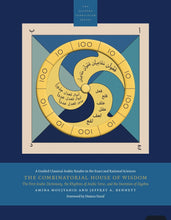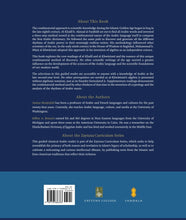The Combinatorial House of Wisdom
- Regular price
- $34.99
- Sale price
- $34.99
- Regular price
-
- Unit price
- /per
The Combinatorial House of Wisdom
A Guided Classical Arabic Reader in the Exact and Rational Sciences
The First Arabic Dictionary, the Rhythms of Arabic Verse, and the Invention of Algebra
Amina Moujtahid and Jeffrey A. Bennett
Foreword by Hamza Yusuf
About This Book
The combinatorial approach to scientific knowledge during the Islamic Golden Age began in Iraq in the late eighth century. Al‑Khalīl b. Aĥmad al-Farāhīdī set out to find all Arabic words and invented a three-step method rooted in the combinatorial nature of the Arabic language itself to compose the first Arabic dictionary. He followed the same path to discover and generate all the different rhythms of Arabic poetry in their seemingly endless variety. His methodology influenced other scientists of the era. In the early ninth century in the House of Wisdom in Baghdad, Muĥammad b. Mūsā al‑Khwārizmī adopted this approach in his invention of algebra as an independent science.
This book explores the core readings of al-Khalīl and al-Khwārizmī and the essence of this unique combinatorial method of discovery. No other scientific writings of the age exerted a greater influence on the development of the sciences of the Arabic language and the scientific foundations of our modern world.
The selections in this guided reader are accessible to anyone with a knowledge of Arabic at the late second-year level. No other prerequisites are needed as al-Khwārizmī’s algebra is presented without algebraic notation, just as its founder formulated it. Supplementary readings demonstrate the combinatorial method used by other thinkers of that time in the invention of cryptology and the analysis of the rhythms of Arabic music.
About the Authors
Amina Moujtahid has been a professor of Arabic and French languages and cultures for the past twenty-four years. Currently, she teaches Arabic language, culture, and media at the University of Washington.
Jeffrey A. Bennett earned BA and MA degrees in Near Eastern languages from the University of Michigan and spent three years at the American University in Cairo. He was a researcher on the Hinds/Badawi Dictionary of Egyptian Arabic and has lived and worked extensively in the Middle East.
About the Zaytuna Curriculum Series
This guided classical Arabic reader is part of the Zaytuna Curriculum Series, which seeks to help reestablish the primacy of both reason and revelation in Islam’s legacy of scholarship, as well as to cultivate a welcoming and curious intellectual climate, by publishing texts from the Islamic and Euro-American traditions that reflect their richness.
The Combinatorial House of Wisdom
A Guided Classical Arabic Reader in the Exact and Rational Sciences
The First Arabic Dictionary, the Rhythms of Arabic Verse, and the Invention of Algebra
Amina Moujtahid and Jeffrey A. Bennett
Foreword by Hamza Yusuf
About This Book
The combinatorial approach to scientific knowledge during the Islamic Golden Age began in Iraq in the late eighth century. Al‑Khalīl b. Aĥmad al-Farāhīdī set out to find all Arabic words and invented a three-step method rooted in the combinatorial nature of the Arabic language itself to compose the first Arabic dictionary. He followed the same path to discover and generate all the different rhythms of Arabic poetry in their seemingly endless variety. His methodology influenced other scientists of the era. In the early ninth century in the House of Wisdom in Baghdad, Muĥammad b. Mūsā al‑Khwārizmī adopted this approach in his invention of algebra as an independent science.
This book explores the core readings of al-Khalīl and al-Khwārizmī and the essence of this unique combinatorial method of discovery. No other scientific writings of the age exerted a greater influence on the development of the sciences of the Arabic language and the scientific foundations of our modern world.
The selections in this guided reader are accessible to anyone with a knowledge of Arabic at the late second-year level. No other prerequisites are needed as al-Khwārizmī’s algebra is presented without algebraic notation, just as its founder formulated it. Supplementary readings demonstrate the combinatorial method used by other thinkers of that time in the invention of cryptology and the analysis of the rhythms of Arabic music.
About the Authors
Amina Moujtahid has been a professor of Arabic and French languages and cultures for the past twenty-four years. Currently, she teaches Arabic language, culture, and media at the University of Washington.
Jeffrey A. Bennett earned BA and MA degrees in Near Eastern languages from the University of Michigan and spent three years at the American University in Cairo. He was a researcher on the Hinds/Badawi Dictionary of Egyptian Arabic and has lived and worked extensively in the Middle East.
About the Zaytuna Curriculum Series
This guided classical Arabic reader is part of the Zaytuna Curriculum Series, which seeks to help reestablish the primacy of both reason and revelation in Islam’s legacy of scholarship, as well as to cultivate a welcoming and curious intellectual climate, by publishing texts from the Islamic and Euro-American traditions that reflect their richness.
Adding product to your cart








